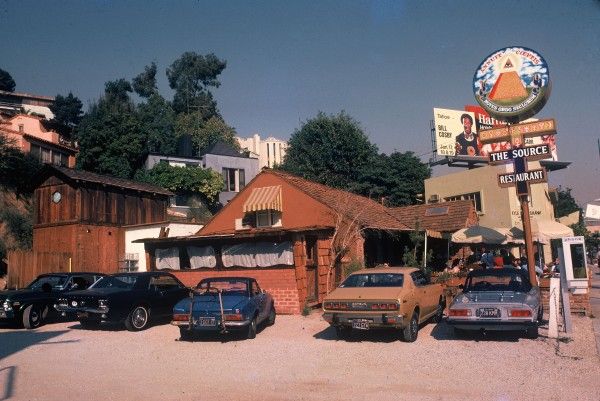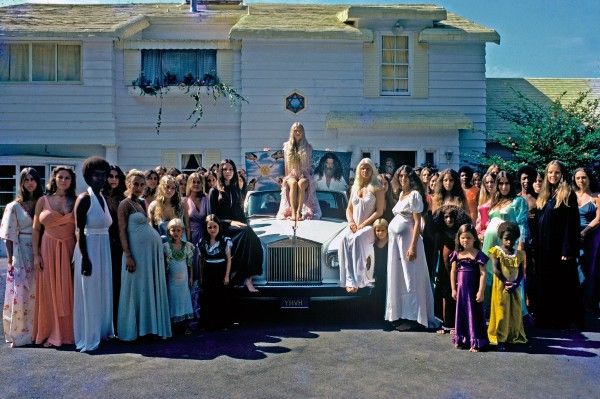Religious cults get a bad rap, which may have something to do with the most famous ones being known for murder and suicide. All religious cults arguably deserve our contempt, but Jodi Wille and Maria Demopoulos' documentary The Source takes an even-handed and level-headed approach to exploring the religious cult dynamic. The rise and fall of Jim Baker's Source Family seems almost cliché, but the film's interview subjects lend the documentary weight by giving not only an insider's view of what was happening, but what they were thinking at the time. By always keeping the film centered on Baker and how he influenced his followers, the directors construct a fascinating sociological study on how adherents flock to a charismatic figure, how the figure changes as he garners more power, and what pushes those adherents to question their devotion (if they ever do).
Jim Baker lived a fascinating life before beginning his cult in the late 1960s. He was a soldier, a judo master, a killer, an actor, a bank robber, and a restaurateur. One of his restaurants was The Source, an organic, vegetarian eatery in Los Angeles that became so popular that it eventually served the biggest Hollywood stars of the time. But rather than make inroads into Hollywood or try to expand his business, Baker began developing what would be known as "The Source Family", a group of open-minded free-spirits that doted on his every word. The family eventually grew into the hundreds, and its follower received new names like "Orbit" and "Electra" and "Isis" and all with the last name "the Aquarian" (the family believed it was "the Age of Aquarius"). As for Baker, at first the family called him "Father" or "Father Yod". Eventually, they called him "God." Through interviews with former members of the Source, the documentary tracks how the cult changed and developed over the course of the late 1960s and early 1970s.
Wille and Demopoulos open with a close-up on a high-resolution photo of Baker staring into the audience and the voice-overs of his adherents on why they worshiped him. One follower even comments, "And I know this sounds insane, but I saw lightning bolts coming out of his ears." It's a striking beginning, and it forces us to seriously consider the interview subjects no matter how loony their comments may be. The directors take advantage of every opportunity to stress the level of power Baker had over his family. Even without mentioning it, viewers will take note of how he stripped them of their birth names, and made his followers call him "Father". However, the film presents Baker not so much as an expert manipulator but as someone with a commanding presence who literally commanded others. One member recalls how she went to the Source Family to borrow some members for a photo shoot (her fiancée needed men who looked like Jesus), and by Baker simply coming up to her, giving her a hug, and saying "You are home," he was able to rip her from her previous life, and give her a completely new one.
The film devotes a bit too much time at the beginning to letting Baker's former followers praise their ex-leader's name. Granted, the move is to establish how close all of the interviewees felt to Baker, but it moves edges slightly into the territory where we start to wonder if we're seeing this documentary through other people's rose-colored glasses. Eventually, the documentary opens up to show the darker side of Baker's rise to power. While there's nothing violent about the Source Family, interview subjects comment on being cut off from their families, and giving the Source all their money. The darkness deepens at The Source examines how Baker became drunk on power and begin breaking his "Ten Commandments". He unsurprisingly moves first towards polygamy, and his first Source wife comments that Baker had a habit of "leaving people when they had served their purpose." Again, Baker never comes off as particularly cruel or manipulative, but simply as a man who was corrupted by his own power.
The Source occasionally trips into unintentional and perhaps unavoidable comedy as we see the clichés of the cult's growth and development. It's a bit unfair to laugh at The Source for showing these clichés since the cult and others like it of the time invented the traits we've come to associate with them. Traits like polygamy, drug use, free love, eastern mysticism, shared dress, and vegetarianism were all qualities of the Source Family. Wille and Demopoulos manage to bring their subject past the clichés by giving time to the insider's perspective even though some of their interviewees have never broken free of Baker's hold.
Most of the subjects interviewed have gone on to "normal" lives free from the hippie lifestyle they once led. The majority of the subjects seem happy for the experience and how it transformed their lives. But only Baker's ex-wife seems to openly disdain the former leader. One man left the group when they wouldn't allow his sick child to have antibiotics, and others left the family when it moved to Hawaii. The interviews are an attempt to convince us that these people weren't crazy, and that the Source ultimately enriched their lives. But as an audience, we're captivated by what drew them into the cult in the first place, and how they found sense in what seems like stupidity.
It's impossible to withhold judgment of those who were members of Baker's cult, but Wille and Demopoulos make sure that we at least hear the other side out. What we hear may sound silly, but it also illuminates the captivating dynamic of cult society. Not only do we have Baker to use as the template for the non-violen cult leader, but we also see how people can live selfish lives and at the same time lose their individualism. Both as piece of micro-history and as a study of the human condition, The Source paints a rich portrait of how people—both leaders and followers—can lose and find themselves through shared delusions.
Rating: B
For all of our SXSW 2012 coverage, click here. Also, here are links to all of my SXSW reviews so far:



